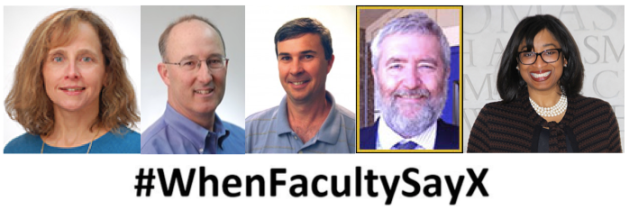Understanding professors’ expectations shouldn’t be a mystery. However, sometimes, there are disconnects between what a faculty member wants a student to produce for a project, and how the student interprets the instructions. In many cases, the expectations of faculty are clearly articulated, either in written or oral format. However, in other cases, there are situations where a faculty member’s feedback or outcomes from discussions regarding progress may not be as clear because they involve aspects of non-verbal communication such as eye contact, gestures, facial expressions, the tone of voice, and eye contact.
Addressing the Needs of Graduate Students
We draw particular attention to the needs of graduate students for our “When Faculty Say X” success seminar series. Graduate students have several forms of faculty interaction that have their own sets of nuances. For graduate students, the faculty member is a teacher, a mentor, an advisor, and a future colleague. There are several phases through which one must pass to navigate the transitions. During coursework, there is the phase where one follows the syllabus, turns in the homework, and takes the exam. During the qualifying exam and proposal stages, it can be difficult for a student to determine what they are supposed to know on the journey toward building expertise in a discipline or particular area of research. In addition to becoming a contributor to the field, a professor may have a methodology that must be employed by all in her lab or a set of theories which need to be used set the foundation for all work that comes out of the research group. There may be bibliographies that one must reference, techniques that must be mastered, and simple “unwritten rules” that must be followed. Some of the rules may include attending every group meeting and each departmental colloquium. Other rules may extend to writing, i.e., explicit use of a citation style, paragraph structure, or drafting process. In the past, we have had in-person seminars and panels where students have a chance to post questions online, and faculty answer them in-person during a dinner seminar.
Launching #WhenFacultySayX 2017
In order to accommodate schedules of faculty guests who will join our seminar this year, and in an attempt involve all of the students in our PROMISE AGEP network and beyond, we are launching an interactive, online version of the seminar that will allow all to participate.
Here’s how it will work.
Between Friday, October 20 and Tuesday, October 31, 2017, we invite graduate students to post questions to faculty below in the comment section (you do not need a WordPress account to participate, we encourage anonymous posts.) We will encourage questions from graduate students broadly, and answers from faculty colleagues from any school.
Faculty: Faculty colleagues from around the world are welcome to share things that they want students to clearly understand, using the hashtag #WhenFacultySayX. You are also welcome to join the conversation below and reply to the comments.
Students: This program was developed for you. It was developed to remove the barriers and fear regarding asking any and all questions related to your success. You may post anonymously. Do you have a question that you want a faculty member to answer?
Post your questions in the comment section of this post at the bottom of this page. You may post anonymously. Our panel of experts will answer each question in the comments as well.
Our featured faculty panel of experts will answer questions that are posted on this website, below.
PROMISE Director, Dr. Renetta Tull (@Renetta_Tull), Dr. Sarah Chard, Dr. L. Michael Hayden, Dr. Christopher Murphy, and Dr. J. Alan Yeakley.

Featured faculty:
- Dr. Sarah Chard, Associate Professor of Anthropology at UMBC, Department of Sociology, Anthropology, and Health Administration and Policy.
- Dr. L. Michael Hayden, Chair, and Professor of Physics at UMBC, Department of Physics.
- Dr. Christopher Murphy, Chair, and Professor of Psychology at UMBC, Department of Psychology.
- Dr. J. Alan Yeakley, Chair, and Professor of Geography and Environmental Systems at UMBC, Department of Geography and Environmental Systems.
- Dr. Renetta Tull – Online Moderator. Dr. RenettaTull will moderate the discussion and will add commentary based on her experience as a former faculty member at University of Wisconsin-Madison, adjunct at College Park (http://hesp.umd.edu/facultyprofile/Tull/Renetta), and member of the program faculty groups for MSRP at MIT, and QoLT at Carnegie Mellon and University of Pittsburgh.
Tull is the University System of Maryland (12 Institutions) Director of Graduate and Professional Pipeline Development, and Special Assistant to the Senior Vice Chancellor for Academic Affairs, http://www.usmd.edu/institutions/; at UMBC she is the Associate Vice Provost for Strategic Initiatives, Professor of the Practice, College of Engineering & IT.
____________________________________________________________
Historical Perspective
____________________________________________________________
The “When Faculty Say X” seminar began as a PROMISE seminar in 2003, initially titled, “Understanding Faculty Expectations” as part of the PROMISE SUCCESS 2003, a precursor to the PROMISE Summer Success Institute (SSI). During an orientation session for new graduate students at UMBC circa 2004, UMBC Psychology Professor Dr. Susan Sonnenschein posted a chart with two columns. The left column noted “What Faculty Say,” and the right column noted, “What They Mean.” PROMISE adopted this method and started the “Faculty X|Y – When Faculty Say X, They Really Mean Y” seminar to allow students to anonymously ask questions, and have a faculty panel answer the questions (grouped by topic area) in person. This seminar has drawn crowds of more than 100 graduate students. The “they really mean y” portion of the title was dropped over time. This 2017 #WhenFacultySayX virtual seminar is the online evolution of those early panels and workshops.
Some of the programs and questions from past years can be found in these links:
Other videos that answer questions from past years can be accessed here: https://www.youtube.com/playlist?list=PL_uKXMv-Mty_sRI31EzJm0E0cJTX20mve
Posted: October 20, 2017, 1:48 PM